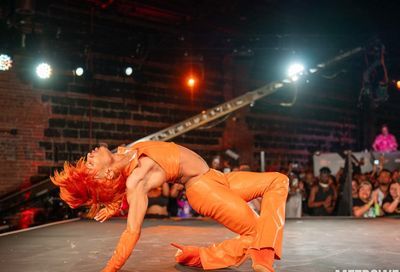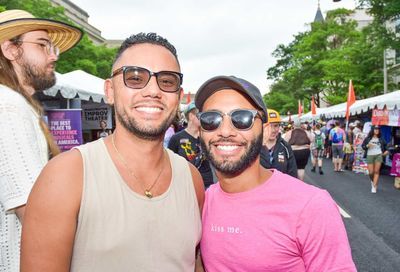Record of the Past
Learning Curve
In this past year, the deaths of poet-activist June Jordan and women’s music founding mamas Kay Gardner and Ginni Clemmens represent a cumulative loss of talent that have deeply affected the lesbian community. Throughout the post-September 11th stress and war buildup, lesbian feminists have, as always, turned to our artists, poets and journalists for both spiritual and intellectual answers. Women have also been mourning the deaths of lesbian journalist Sarah Pettit and, not long before, cartoonist Kris Kovick. To lose so many sages in one short period has been daunting, particularly because the lesbian community — while deeply affected by the challenges of breast and ovarian cancers, and environmental illnesses — did not experience the abrupt and enormous loss of young artists that gay men grieved at the onset of AIDS.
Many of us who felt entitled to point the finger at men’s unsafe sex practices somehow believed that lesbians were an ageless tribe, spared, special; the Angel of Death would “pass over” us. I cringe to think of the numberless letters I wrote to newspaper editors whenever some fundamentalist called AIDS God’s punishment for homosexuals. “So why aren’t lesbians dying?” was my smugly insensitive challenge to assorted reverends and Congressmen.
Not only did we wrongly believe we were immune to sexually transmitted diseases, we also thought that lesbians would always be less “ageist,” “looksist” and youth-obsessed than gay men. Hence, we’d not only live forever but still rule the tribe as hot and sexy goddess babes at an age when guys were busy snubbing one another in bars. We prized our unglamorous looks, our survivor stories — comparing garish sports injuries from pre-Title IX, putting tattoos on mastectomy scars. Nothing could kill us — look at Miss Ruth Ellis, who lived 100 years! And it was forgivable, even hip, to lack medical insurance and a 401K. No one was supposed to work in “the system.”
Every lesbian I knew in the 1980s and 90s was a struggling artist, craftswoman, or writer outside the corporate mainstream, and so when someone fell ill the hand-Xeroxed flyers went around the women’s music festivals: “Please Donate” for her medical fees. The best health care in the world was and still is available at the Michigan festival, where everyone had access to more/nicer/better physicians and homeopathic resources than most could afford at home. And workers looked forward to that free hour of massage (Any style! Pick your preferred masseuse!) in the chiropractic tent. In such ways, we felt we’d care for one another forever.
That two of the longest-lasting, yet by no means old, artists in the women’s music scene could be taken from us within six months makes many of us middle-aged dykes feel keenly vulnerable, aware of creeping time and unplanned exits. What are the conversations we should be having with our not-so-elders while they’re here? Who is going to remember, preserve and archive the legacy of the women’s music movement besides me, and my valiant pals Toni Armstrong Jr., Kim Kimber, Judy Dlugacz, June Millington, and the Schlesinger Library at Radcliffe?
Back in the day, no one expected to get rich as a lesbian artist, but we all thought we’d grow old together, and a few inspired souls started land-dyke communities as a feisty alternative to old-age homes. I envisioned myself on some front porch at 80-years-old listening to the stories of my 95-year-old pals — I always prefer to hang with the “big girls.” My friends, likewise optimistic, bought lifetime passes to women’s music festivals, and I recall the thrill I felt, at 20, when I read that at age 60 or 65 I’d be allowed into Michigan FREE! I assumed it would all be there for me, in 2026–women’s bookstores and festivals, unaltered.
While Michigan is still going strong, at 42 I’m beginning to get it about the temporary nature of a specific lesbian culture I’ve called home for several decades. And as a historian, I can document and grieve at the same time, noting the closure of almost every women’s bookstore I ever perused, and the bankruptcy of independent lesbian presses that were poised to publish my next books. Ouch. I can respond with feeling to the disappearance of ten or more good women’s festivals and the recent hostility towards Michigan’s woman-born policy.
But the actual deaths of artists I’ve partied with? Whoa. The historian reels, halts, is silenced. And as a younger friend to Kay and Ginni, I even feel a certain shame: Did I interview them enough, praise their contributions enough in my work or to their faces, when they were, so recently, alive? Ginni came up to me at a party celebrating the publication of my book on festival culture and said “I haven’t read your book myself because I’m afraid I might not be in it.” How keenly the non-mainstream need to be remembered! And yes, that is my job.
The thing about coming out as a very young person is that you will, surely, outlive some of your role models. I’d like to recommend that some of the younger lesbians bent on trashing the Michigan festival instead shift their energy into interviewing the many older artists who made lesbian music performances possible, yet never became “famous.” Love them while they’re here, man. Gay celebrity culture may have replaced grassroots. But let’s honor the great record of those women who made records.
Bonnie J. Morris, Ph.D., is on the women’s studies faculty at George Washington University and Georgetown University. She can be reached at bmorris@metroweekly.com.
Support Metro Weekly’s Journalism
These are challenging times for news organizations. And yet it’s crucial we stay active and provide vital resources and information to both our local readers and the world. So won’t you please take a moment and consider supporting Metro Weekly with a membership? For as little as $5 a month, you can help ensure Metro Weekly magazine and MetroWeekly.com remain free, viable resources as we provide the best, most diverse, culturally-resonant LGBTQ coverage in both the D.C. region and around the world. Memberships come with exclusive perks and discounts, your own personal digital delivery of each week’s magazine (and an archive), access to our Member's Lounge when it launches this fall, and exclusive members-only items like Metro Weekly Membership Mugs and Tote Bags! Check out all our membership levels here and please join us today!






















